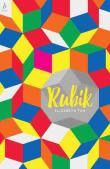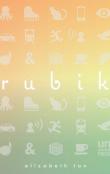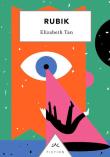
Latest Issues
AbstractHistoryArchive Description
'Elena Rubik can’t seem to stay dead. She persists: as a set of corneas, as a newsletter subscriber, as a member of fanfiction forums. Her best friend Jules Valentine meanwhile is unwittingly inveigled into an indie-film turned corporate branding stunt. When Jules leaks information about the true story behind the video – by then an overworked viral meme – wannabe investigative reporter April Kuan is assigned the case. But as April trails Jules all over Perth she too becomes ensnared in the machinations of shady corporate interests as the very laws of physics and time begin to bend.
'Rubik is a wide-ranging, brilliantly intertwined novel-in-stories that slip outside the borders of realism. Spotted with disappearances, mysteries and told with a sharp-edged wit and cutting social commentary, it is an original and ingenious reflection of technological anxiety, loneliness and connectivity in the internet age.' (Publication summary)
Notes
-
In February 2019, Rubik was optioned for film by Australian company Photoplay.
Publication Details of Only Known VersionEarliest 2 Known Versions of
Other Formats
- Also sound recording.
Works about this Work
-
'Rubik' by Elizabeth Tan
2017
single work
review
— Appears in: Australian Book Review , November no. 396 2017; (p. 29)
— Review of Rubik 2017 single work novel'Invoking the Rubik’s Cube – a puzzle where twenty-six ‘cubelets’ rotate around a core crosspiece – Rubik is less a novel and more a book of interconnected short stories exploring narcissism, neoliberalism, and consumerism. At the book’s core is Elena Rubik, who dies in the first chapter with a Homestyle Country Pie in her hand. Despite her demise, Elena remains the protagonist of the novel via her robust digital footprint: people write ‘condolence messages on her profile ... express[ing] their grief in 420 characters or less’, weekly newsletters amass in her inbox, she endures as a contact in her friend’s mobile phone directory, and her comments remain on internet forums. Elizabeth Tan responds to the cube’s solution of returning all sides to a uniformity of colour by emphasising the isolation, despair, and quotidian nihilism at the heart of contemporary society’s obsession with competitive self-interest and extreme individualism.' (Introduction)
-
Australian Fiction
2017
single work
essay
— Appears in: The Weekend Australian , 17 June 2017; (p. 21) 'Cli-fi, which imagines our world in the aftermath of climate change, is booming. It’s a brand of dystopian narrative that often features desiccated landscapes, where resources are scarce and contested and ingenuity is required just to survive. Lotus Blue (Talos, 382pp, $22.99), the debut novel from Cat Sparks, a much anthologised science fiction writer, is a compelling addition to these ranks.' (Introduction) -
Elizabeth Tan : Rubik
2017
single work
essay
— Appears in: The Newtown Review of Books , June 2017; 'Rubik is a wonderful experiment in fiction, exploring a vast landscape within the contained borders of a novel.' -
Elizabeth Tan, Rubik
2017
single work
essay
— Appears in: The Saturday Paper , 1-7 April 2017; 'The term “experimental fiction” can be used to cover a multitude of sins: an almost petulant obsession with abstraction and a disdainful disregard for the experience of the reader, among them. When it works, though, we have novels in the tradition of Kafka, Woolf and Foster Wallace. The very best experimental writers have an inspired and weird way of seeing the world that makes much realist fiction seem moribund. Elizabeth Tan’s debut novel-in-stories, Rubik, is in the latter category: it’s wonderful, brilliant and mind-bending, and a worthy heir to the experimental tradition. (Introduction) -
System Override
2017
single work
interview
— Appears in: Books + Publishing , February vol. 96 no. 3 2017; (p. 25) 'Elizabeth Tan's Rubik is a novel of interconnected short stories with plotlines that explore 'a sprawling world of shady corporations, sentient memes and hackable bodies'. The result is 'conceptually and structurally breathtaking', writes reviewer Alan Vaarwerk. He spoke to the author.'
-
'Rubik' by Elizabeth Tan
2017
single work
review
— Appears in: Australian Book Review , November no. 396 2017; (p. 29)
— Review of Rubik 2017 single work novel'Invoking the Rubik’s Cube – a puzzle where twenty-six ‘cubelets’ rotate around a core crosspiece – Rubik is less a novel and more a book of interconnected short stories exploring narcissism, neoliberalism, and consumerism. At the book’s core is Elena Rubik, who dies in the first chapter with a Homestyle Country Pie in her hand. Despite her demise, Elena remains the protagonist of the novel via her robust digital footprint: people write ‘condolence messages on her profile ... express[ing] their grief in 420 characters or less’, weekly newsletters amass in her inbox, she endures as a contact in her friend’s mobile phone directory, and her comments remain on internet forums. Elizabeth Tan responds to the cube’s solution of returning all sides to a uniformity of colour by emphasising the isolation, despair, and quotidian nihilism at the heart of contemporary society’s obsession with competitive self-interest and extreme individualism.' (Introduction)
-
System Override
2017
single work
interview
— Appears in: Books + Publishing , February vol. 96 no. 3 2017; (p. 25) 'Elizabeth Tan's Rubik is a novel of interconnected short stories with plotlines that explore 'a sprawling world of shady corporations, sentient memes and hackable bodies'. The result is 'conceptually and structurally breathtaking', writes reviewer Alan Vaarwerk. He spoke to the author.' -
Elizabeth Tan, Rubik
2017
single work
essay
— Appears in: The Saturday Paper , 1-7 April 2017; 'The term “experimental fiction” can be used to cover a multitude of sins: an almost petulant obsession with abstraction and a disdainful disregard for the experience of the reader, among them. When it works, though, we have novels in the tradition of Kafka, Woolf and Foster Wallace. The very best experimental writers have an inspired and weird way of seeing the world that makes much realist fiction seem moribund. Elizabeth Tan’s debut novel-in-stories, Rubik, is in the latter category: it’s wonderful, brilliant and mind-bending, and a worthy heir to the experimental tradition. (Introduction) -
Elizabeth Tan : Rubik
2017
single work
essay
— Appears in: The Newtown Review of Books , June 2017; 'Rubik is a wonderful experiment in fiction, exploring a vast landscape within the contained borders of a novel.' -
Australian Fiction
2017
single work
essay
— Appears in: The Weekend Australian , 17 June 2017; (p. 21) 'Cli-fi, which imagines our world in the aftermath of climate change, is booming. It’s a brand of dystopian narrative that often features desiccated landscapes, where resources are scarce and contested and ingenuity is required just to survive. Lotus Blue (Talos, 382pp, $22.99), the debut novel from Cat Sparks, a much anthologised science fiction writer, is a compelling addition to these ranks.' (Introduction)
Awards
- 2018 shortlisted Mascara Avant-garde Awards — Fiction
- Perth, Western Australia,






